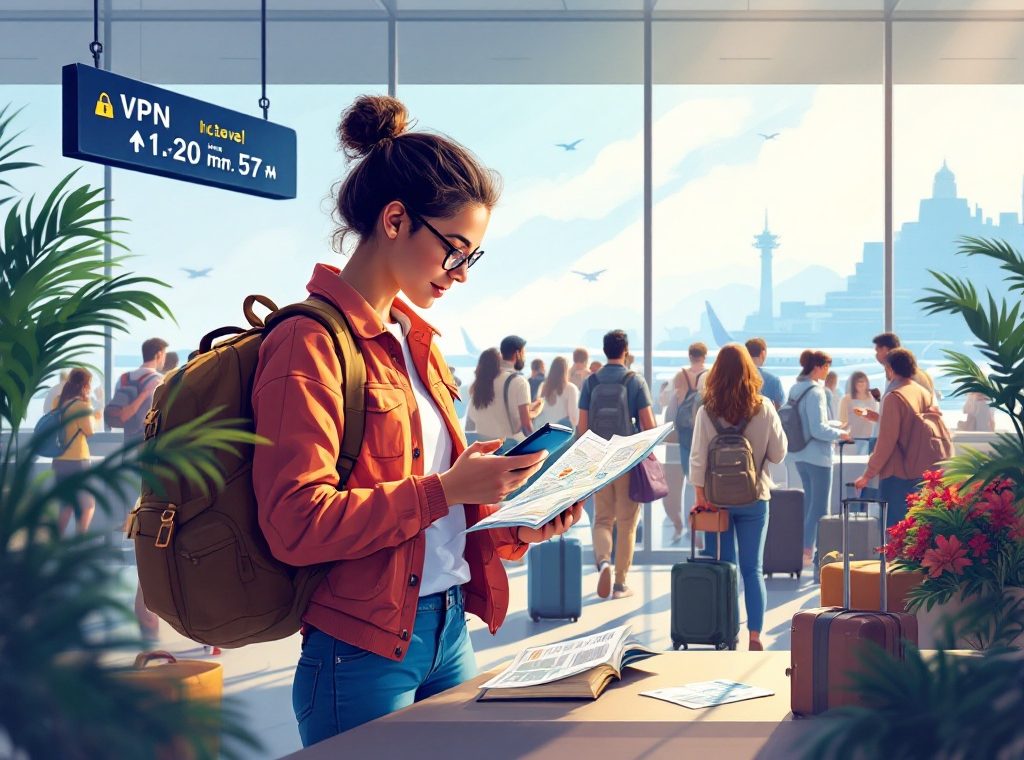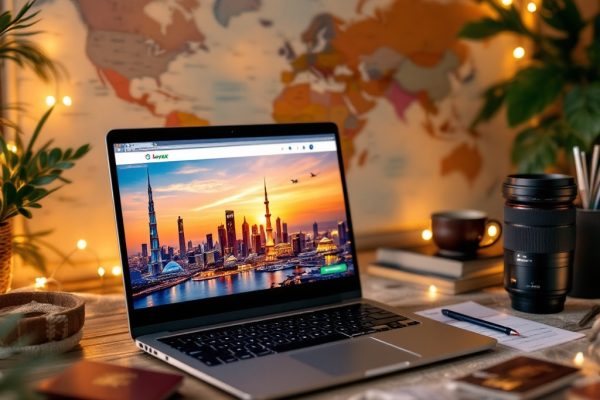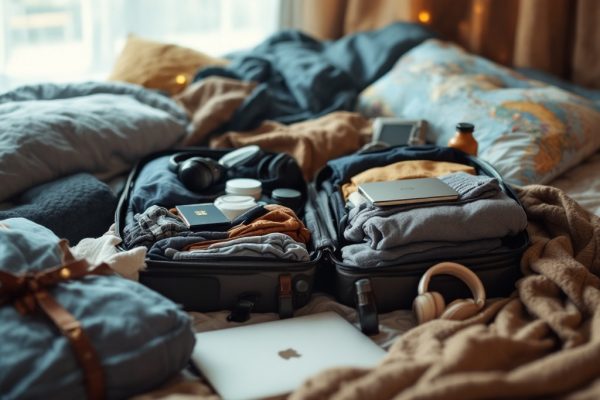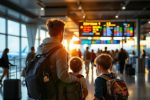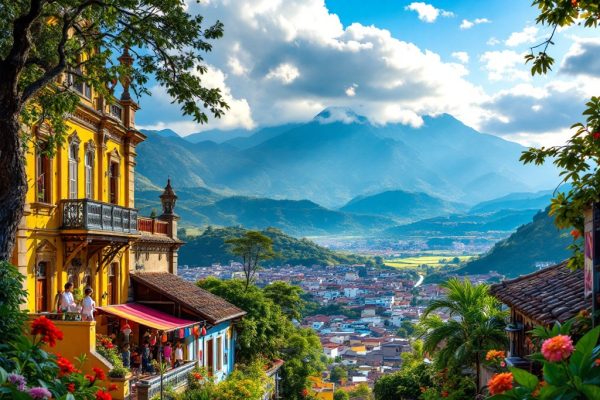Crucial Safety Tips for Traveling Abroad Everyone Should Follow
Planning an international trip? Don’t let safety concerns hold you back! This comprehensive guide provides essential tips for a secure and enjoyable journey. Learn how to research your destination, manage your money, protect your belongings, and stay healthy abroad. Discover practical advice on everything from using a VPN on public Wi-Fi to safeguarding your hotel room. Empower yourself with knowledge and embark on your adventure with confidence. Read on to start planning your safe international travel experience.
Important information
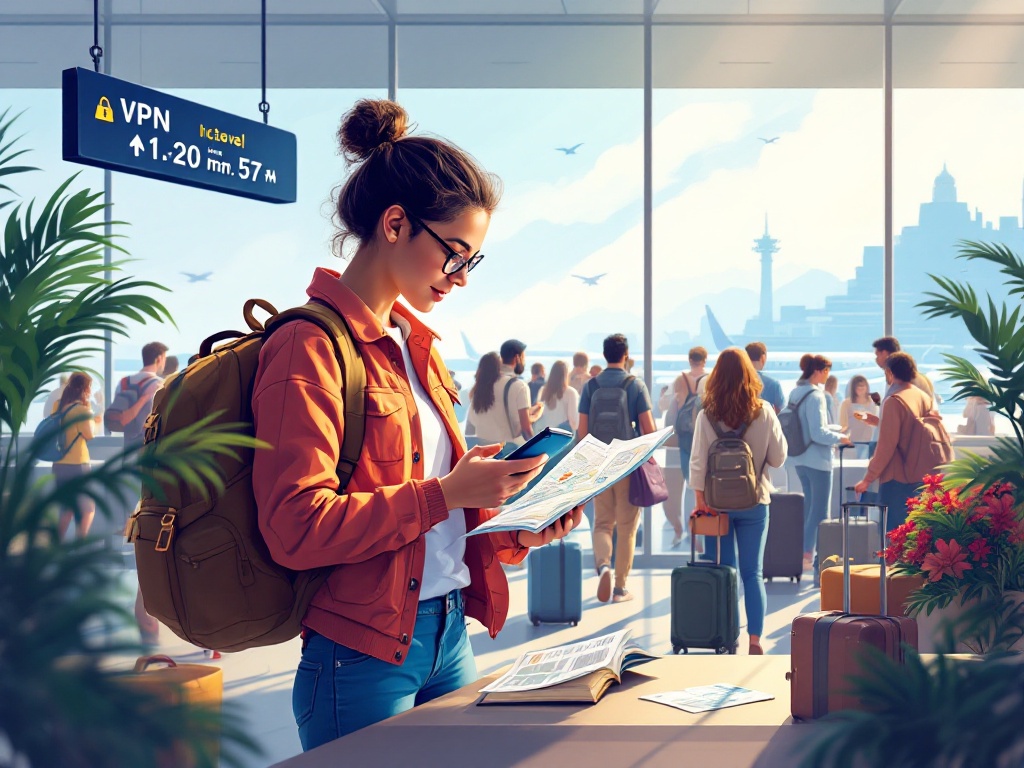
- Research your destination: Learn about local laws, customs, and safety concerns. Check travel advisories and visa requirements.
- Protect your finances: Inform your bank about your travel dates. Use secure payment methods like credit cards or prepaid travel cards. Avoid large sums of cash.
- Safeguard your health: Get a pre-travel checkup 4-6 weeks before departure. Discuss vaccinations and medications with your doctor. Pack a first-aid kit.
- Secure your belongings: Use anti-theft bags and money belts. Store valuables in hotel safes. Be mindful of your surroundings, especially in crowded areas.
- Enhance digital safety: Use a VPN, especially on public Wi-Fi, to protect your online information.
Travel Safety Tips for International Travel
Prioritizing safety is paramount when planning international travel. Thorough research on your destination’s local laws, customs, and cultural norms is crucial for a smooth trip. Consult your government’s travel advisories for any entry requirements or safety concerns before you go. Pre-planning your arrival and transportation adds an extra layer of security, such as booking airport transfers or using official taxi services. Understanding public transportation routes and schedules is helpful, but exercise caution, especially at night. If renting a car, familiarize yourself with local driving laws, which can differ significantly from your home country, and secure any necessary international driving permits. Always be mindful of your belongings and surroundings, avoid displaying expensive jewelry or electronics, and refrain from walking alone in poorly lit areas, especially at night.
Research Your Destination and Customs
Traveling the world? Start with research! Learning about your destination’s customs, laws, and safety concerns can prevent misunderstandings and ensure a respectful trip. Understanding cultural norms, like which hand gestures to avoid, can significantly enhance your travel experience. For your safety, research unsafe areas and know how to contact local emergency services. When visiting religious sites, modest dress often demonstrates respect for local traditions. Plan ahead, stay informed, and enjoy your travels!
Research your destination’s customs and laws. This will help you avoid misunderstandings and ensure a respectful trip.
Learn about cultural norms. Understanding these norms, such as appropriate hand gestures, can greatly enhance your experience.
Prioritize your safety. Research unsafe areas and know how to contact local emergency services.
Dress respectfully when visiting religious sites. Modest attire often demonstrates respect for local traditions.
Check Travel Advisories and Entry Requirements
Before your trip, check the U.S. Department of State’s travel website for travel advisories and alerts. Verify your destination’s entry requirements, including visa and vaccination policies, and any restrictions that may apply based on your nationality. Planning ahead is crucial.
Plan Arrival and Transportation
Pre-planning your hotel transportation will make your arrival smoother, especially if you can arrive during daylight. Navigating a new area is much easier when you can see your surroundings.
Important Travel Documents and Money Management
Safeguard your essential documents by creating digital and physical copies:
- passport,
- visa,
- driver’s license,
- travel insurance.
Store these copies separately from the originals, preferably in a money belt or hotel safe.
Before traveling, take the following financial precautions:
- Inform your bank and credit card companies of your travel dates to prevent transaction issues.
- Understand foreign transaction fees and consider a travel-friendly credit card.
- Prioritize secure payment methods like credit cards or prepaid travel cards.
- Minimize carrying large sums of cash.
Carry Essential Documents and Make Copies
Safeguard your essential travel documents by creating both digital and physical backups. Store digital copies securely in a password-protected cloud service or on your mobile device. A money belt or neck pouch provides discreet and secure storage for physical copies, protecting them against loss or theft.
Notify Banks and Manage Foreign Transaction Fees
Before your international trip, inform your bank and credit card companies about your travel plans. This will prevent them from blocking your accounts due to unusual transactions abroad. Also, ask about foreign transaction fees, which can add up quickly. To minimize these costs, consider options like travel credit cards or prepaid travel cards. Check if your current card offers any travel benefits.
Use Secure Payment Methods
For safer transactions, use cash at internet cafes. Avoid using credit cards at these locations and ATMs in questionable areas to protect your financial information.
Health and Medical Considerations for Travelers
Before embarking on your travels, schedule a doctor’s appointment 4-6 weeks in advance. Discuss necessary vaccinations and any existing health concerns with your physician. They can provide valuable travel health advice and ensure you’re up-to-date on recommended immunizations. It’s also wise to confirm your health insurance coverage while abroad.
Research your destination’s vaccination requirements. Carry your records with you.
Familiarize yourself with regulations regarding traveling with prescription medications. Ensure they’re packed in their original containers along with a copy of your prescription.
A well-stocked first-aid kit is essential for any trip. Pack pain relievers, antiseptic wipes, bandages, motion sickness medication, insect repellent, and sunscreen.
Remember any recommended personal protective equipment like masks or hand sanitizer.
Get a Pre-Travel Health Checkup
Consult your doctor 4-6 weeks before an international trip. Discuss necessary vaccinations and boosters, as requirements depend on your destination and health history. Review any current health concerns and refill necessary prescriptions. Your doctor can provide helpful, destination-specific travel advice.
Check Vaccination Proof and Medication Regulations
Planning your trip effectively involves several key steps. First, determine the visa requirements for your destination by contacting the embassy or consulate. They can also provide information on regulations for any medications you are taking. Second, ensure a smooth trip by reviewing travel advisories from reliable sources and staying informed about local news. Lastly, connect with fellow travelers online for helpful tips and insights.
Pack a First Aid Kit and Personal Protection Supplies
A well-stocked first aid kit is crucial for treating minor injuries. Be sure to include:
- bandages,
- antiseptic wipes,
- pain relievers, and
- any personal medications.
For hygiene and health safety, pack the following:
- masks,
- hand sanitizer, and
- disinfectant wipes.
Finally, safeguard your valuables with a money belt or hidden pouch.
Insurance and Emergency Preparedness
Traveling abroad? Travel medical insurance is a must-have for unexpected medical costs, protecting you throughout your international trips. Medical evacuation insurance is vital for emergency transport back home or to a suitable medical facility. U.S. citizens and nationals can enroll in the Smart Traveler Enrollment Program (STEP) at the nearest U.S. Embassy or Consulate. STEP offers valuable resources and boosts safety and peace of mind while traveling internationally.
Consider Travel Medical Insurance and STEP Enrollment
Travel medical insurance safeguards your health and well-being by covering expenses like hospital stays and emergency evacuations, providing peace of mind during your trips. Enroll in the Smart Traveler Enrollment Program (STEP) to receive safety updates and allow officials to contact you during crises. Protect yourself before your next adventure with travel medical insurance and STEP enrollment.
Prepare for Emergencies and Notify Contacts
Before embarking on your journey, inform a friend or family member about your itinerary. Touch base with them periodically so they know your whereabouts. Keep a list of emergency contacts readily available, including local emergency services, your embassy or consulate, and your hotel details. Make copies of essential documents like your passport and visa, storing them separately from the originals. Travel insurance is highly recommended, as it can be invaluable in medical emergencies or evacuations. A well-prepared plan will provide peace of mind during your travels.
Accommodation and Lodging Safety
Prioritize safety when choosing your accommodation. Thoroughly research neighborhoods and read online reviews before booking. Look for hotels with robust security features like 24/7 monitoring and well-lit areas. Upon arrival, inspect your room for any potential safety concerns. Utilize all available locks on doors and windows. Double-check the door’s security before leaving. Store valuables in the room safe, or keep them on your person if a safe isn’t available. If you notice anything suspicious or concerning during your stay, report it to hotel management or local authorities immediately.
Before you book:
- Research the neighborhood thoroughly,
- Read online reviews,
- Look for hotels with robust security features (24/7 monitoring, well-lit areas).
After you arrive:
- Inspect your room for safety concerns,
- Use all available locks on doors and windows,
- Double-check the door’s security before leaving,
- Store valuables in the room safe or keep them on your person.
Choose Safe Neighborhoods
Prioritize safety by researching neighborhoods before booking accommodations. Check crime statistics and the proximity of emergency services. Consult local recommendations via travel guides, online forums, and hotel reviews for valuable insights from past visitors. Opt for well-lit and populated areas, especially at night. Always stay aware of your surroundings.
Research neighborhoods thoroughly before making any reservations. Look into crime statistics and the availability of emergency services in the area.
Consult a variety of resources for local recommendations. These include travel guides, online forums, and hotel reviews, which can offer valuable insights from previous visitors.
Choose well-lit and populated areas for your stay, particularly if you will be out at night. Increased visibility and the presence of other people can deter potential threats.
Maintain situational awareness at all times. Pay attention to your surroundings and be vigilant about potential safety risks.
Safeguard Your Hotel Room
Utilize the hotel safe to secure valuable items such as passports, cash, and electronics.
Lock your luggage whenever it is left unattended for increased security.
Hang the “Do Not Disturb” sign on your door before leaving your room.
Exercise caution if someone knocks while the “Do Not Disturb” sign is displayed. Confirm their identity if they claim to be hotel staff before opening the door.
Upon entering your room, check for hidden cameras, and ensure both windows and connecting doors are securely locked for enhanced safety and peace of mind.
Personal and Belongings Security
Safeguard your belongings by keeping luggage and personal items within sight, avoiding the display of valuables like jewelry or electronics. Enhance security with anti-theft bags and backpacks, particularly in crowded areas such as transportation hubs and tourist attractions, which are often targeted by pickpockets. For essential documents and cash, a money belt or hidden pouch offers added protection.
Prepare for emergencies by storing crucial contacts, including local police and your embassy, in your phone and a physical notebook. Share your itinerary with loved ones and learn about local emergency procedures for peace of mind.
Prevent Theft and Pickpocketing
Store valuables in your front pockets for easy access and increased security.
Utilize anti-theft bags and money belts to protect important documents and cash.
Secure luggage and other belongings in hotel safes whenever available.
Maintain awareness of your surroundings, especially in crowded areas, and never leave your belongings unattended.
Consider using tracking devices on valuable items for added security.
Keep Important Contacts and Emergency Numbers
Before traveling, compile a list of essential contacts. This list should include: local emergency services, your embassy or consulate, your hotel, and close family and friends. Store these numbers in your phone and also consider a physical copy as a backup. A local SIM card can simplify making calls and often reduces expenses.
Technology and International Communication
A VPN significantly enhances your online security and privacy in today’s interconnected world. When you connect to a public Wi-Fi network, your data becomes vulnerable to cyber threats. A VPN establishes a secure connection, encrypting your internet traffic and protecting sensitive information like passwords and financial data. Using a VPN is especially crucial on public Wi-Fi, which often lacks robust security measures, making you susceptible to cyberattacks. Therefore, for enhanced online safety, especially on public Wi-Fi, using a VPN is highly recommended.
Use a VPN for Cybersecurity
A VPN creates a secure connection that encrypts your data and masks your IP address. This potent combination shields you from hackers and data breaches, particularly on public Wi-Fi. Furthermore, a VPN unlocks geo-restricted content, granting access to websites and services otherwise unavailable in your region. It also enhances your online security and expands your browsing possibilities. A VPN offers the following benefits:
- Enhanced security: a VPN encrypts your internet traffic, protecting your data from hackers and snoopers, especially on public Wi-Fi networks.
- Bypass geo-restrictions: a VPN allows you to access websites and services that are blocked in your region, such as streaming platforms and social media sites.
- Increased privacy: by masking your IP address, a VPN prevents websites and advertisers from tracking your online activity and collecting your data.
- Secure torrenting: a VPN can protect your privacy while torrenting by encrypting your traffic and hiding your IP address.
- Improved gaming experience: a VPN can reduce lag and improve ping times in online games by connecting you to a server closer to the game server.
Be Wary of Public Wi-Fi
Public Wi-Fi hotspots offer convenience but often compromise security, leaving your devices and data exposed. Refrain from accessing sensitive information, such as bank accounts or emails, on these networks. A virtual private network (VPN) provides an extra layer of security by encrypting your data and shielding it from prying eyes. For enhanced protection on public Wi-Fi, consider using a VPN.
Awareness and Mindset for Safe Travel
Prioritize your safety by staying aware of your surroundings, especially in crowded areas or on public transport. Research safe neighborhoods and reliable transportation options before your trip. Avoid walking alone at night in unfamiliar or poorly lit areas. If you feel uncomfortable, trust your instincts and leave the situation. On buses and trains, be vigilant about your belongings to prevent theft.
Traveling with companions is generally safer. If solo travel is necessary, share your itinerary with a trusted contact and check in regularly. A group offers increased security and support in unfamiliar places, deterring potential issues.
Research your destination. Before you go, research safe neighborhoods and identify reliable transportation options.
Be aware of your surroundings. Stay alert, especially in crowded places and on public transport.
Avoid walking alone at night. Steer clear of unfamiliar or poorly lit areas after dark.
Protect your belongings. Keep a close eye on your possessions on buses and trains.
Share your itinerary. If traveling solo, share your travel plans with someone you trust and check in with them frequently.
Be Aware of Surroundings and Public Transport Safety
Be cautious of your surroundings, especially on public transport.
Refrain from openly displaying valuable items like electronics and jewelry.
Keep your belongings secure and close to you at all times.
Stay alert to the possibility of pickpockets, especially in crowded areas.
If you sense a potentially unsafe situation, relocate to a safer spot.
Travel in Groups for Enhanced Safety
Traveling with a group enhances safety, especially in unfamiliar territories. Group travel can deter potential threats. In emergencies, being part of a group offers crucial support. There is security in numbers.

